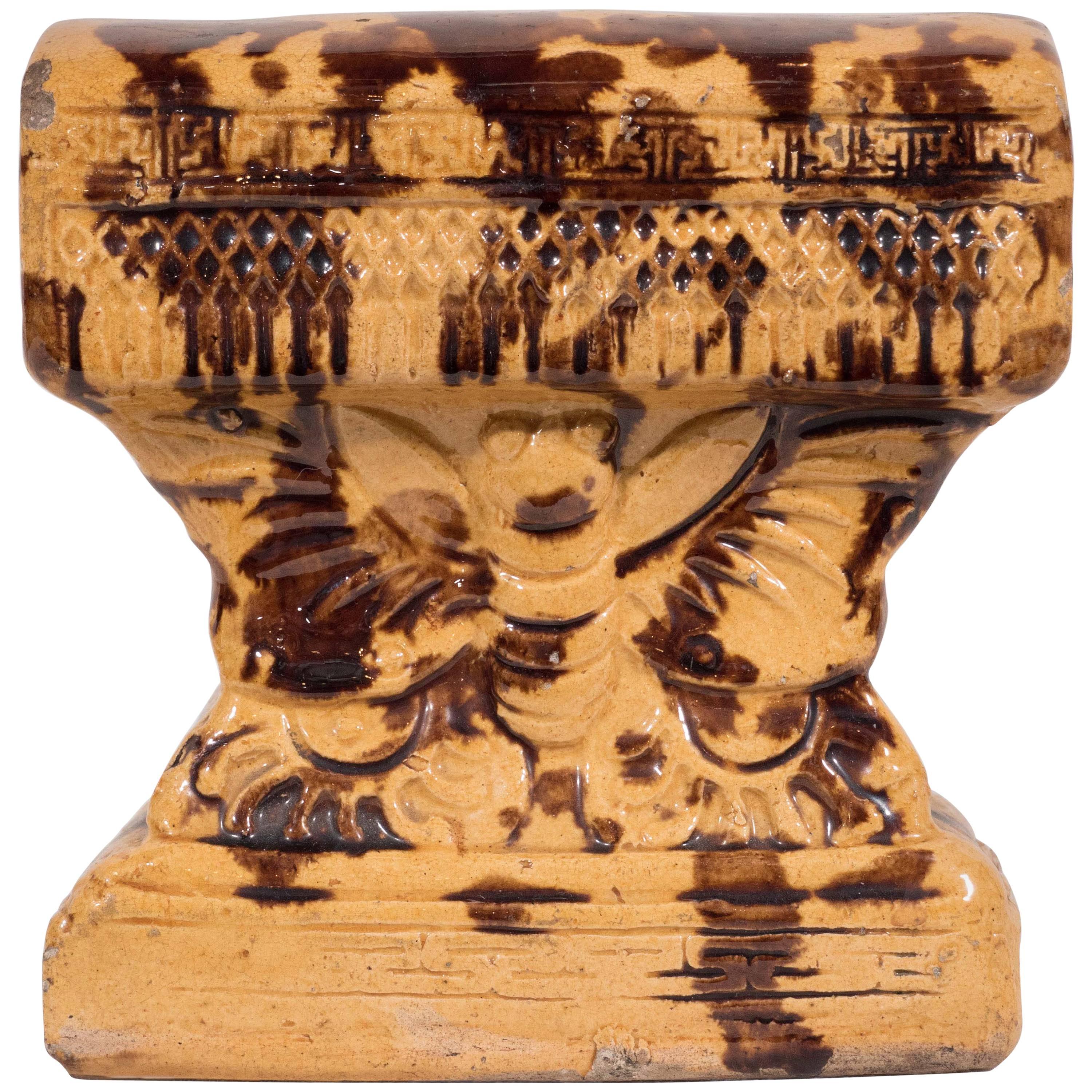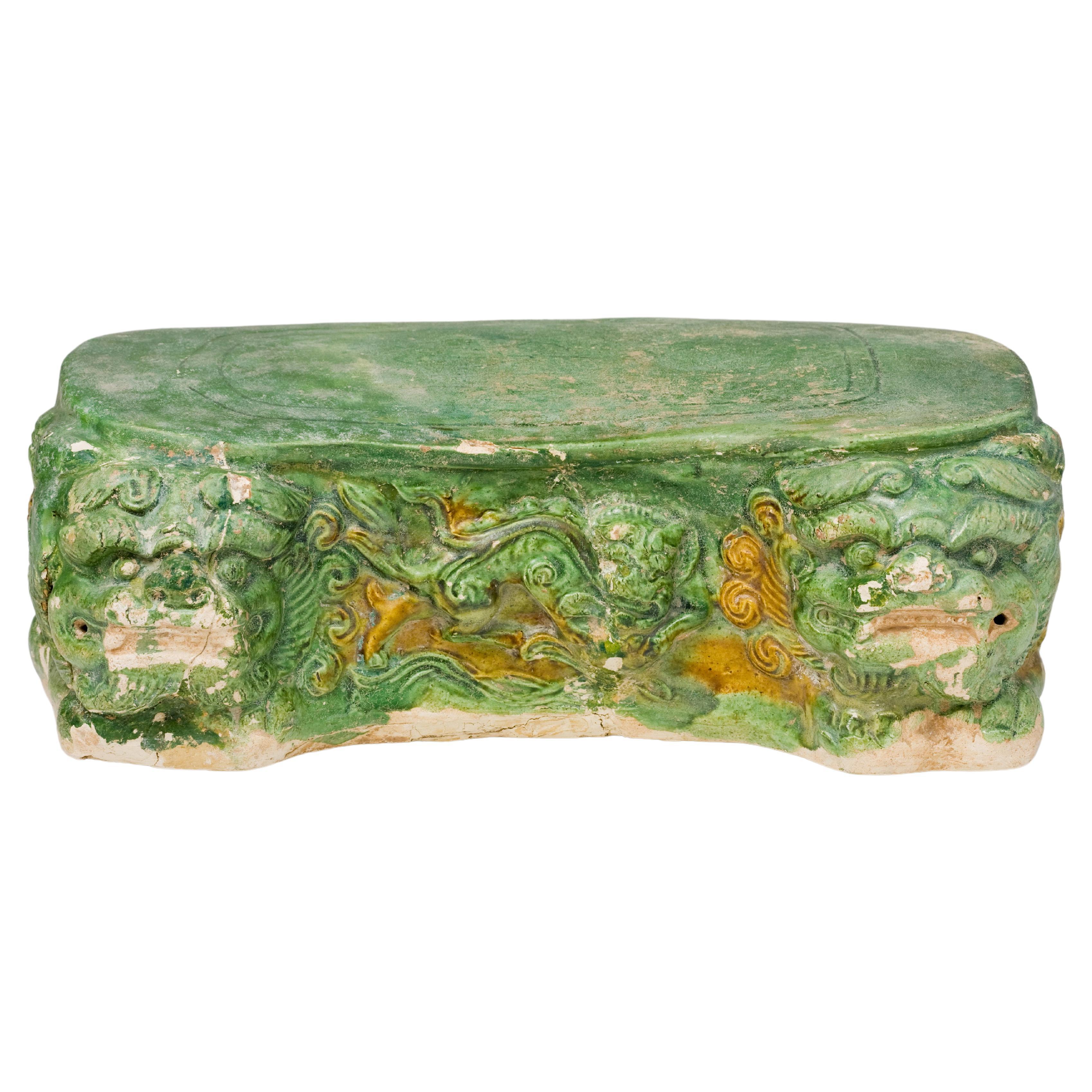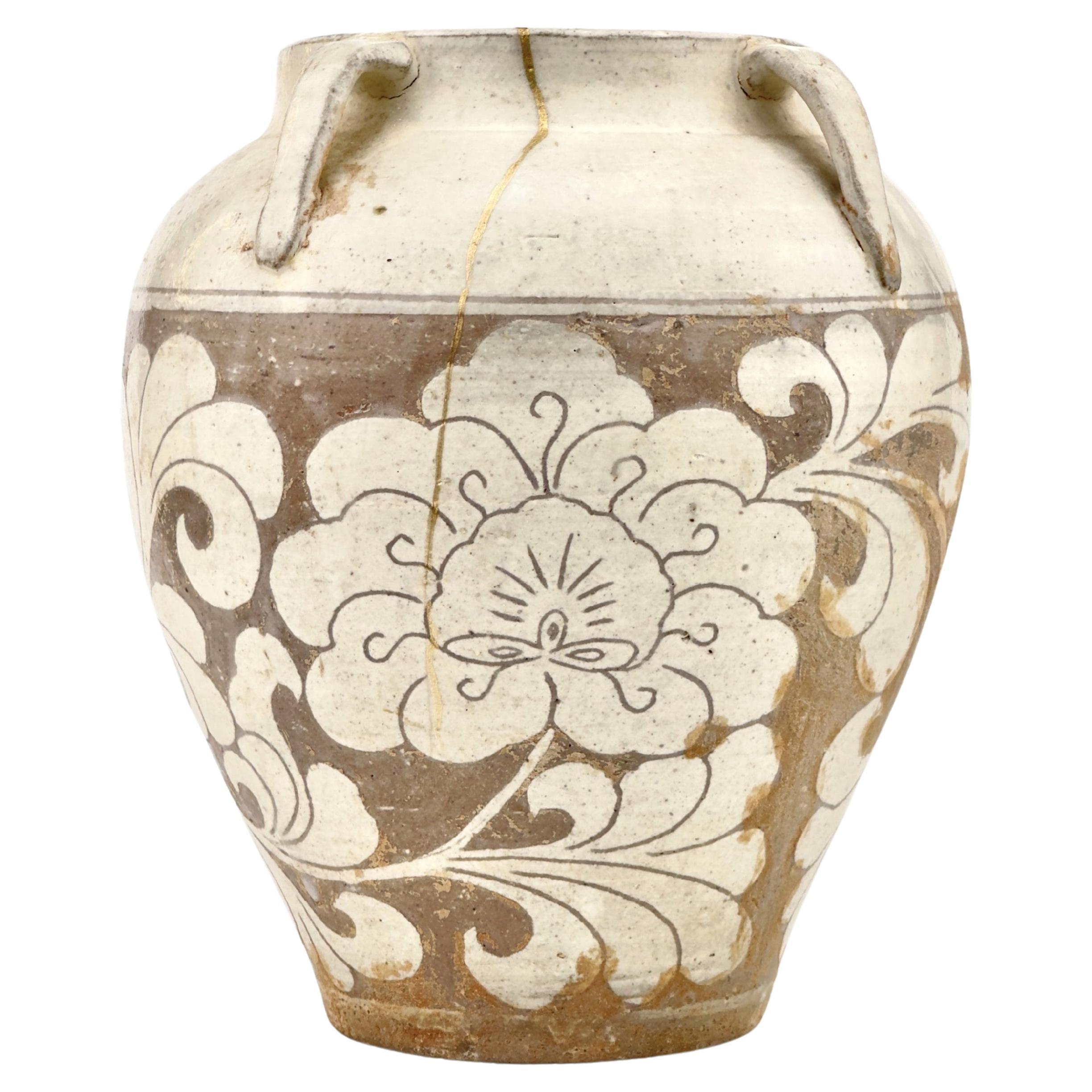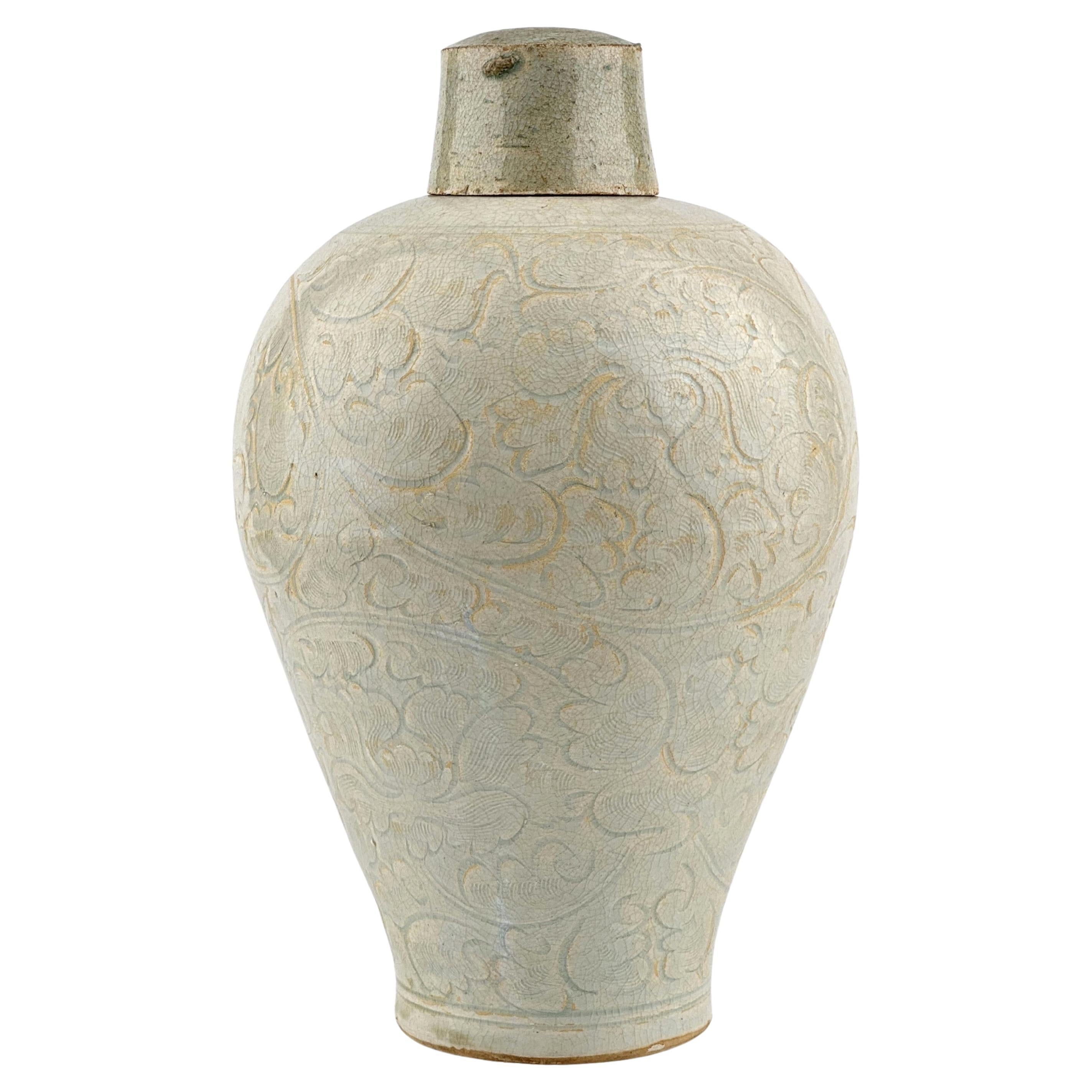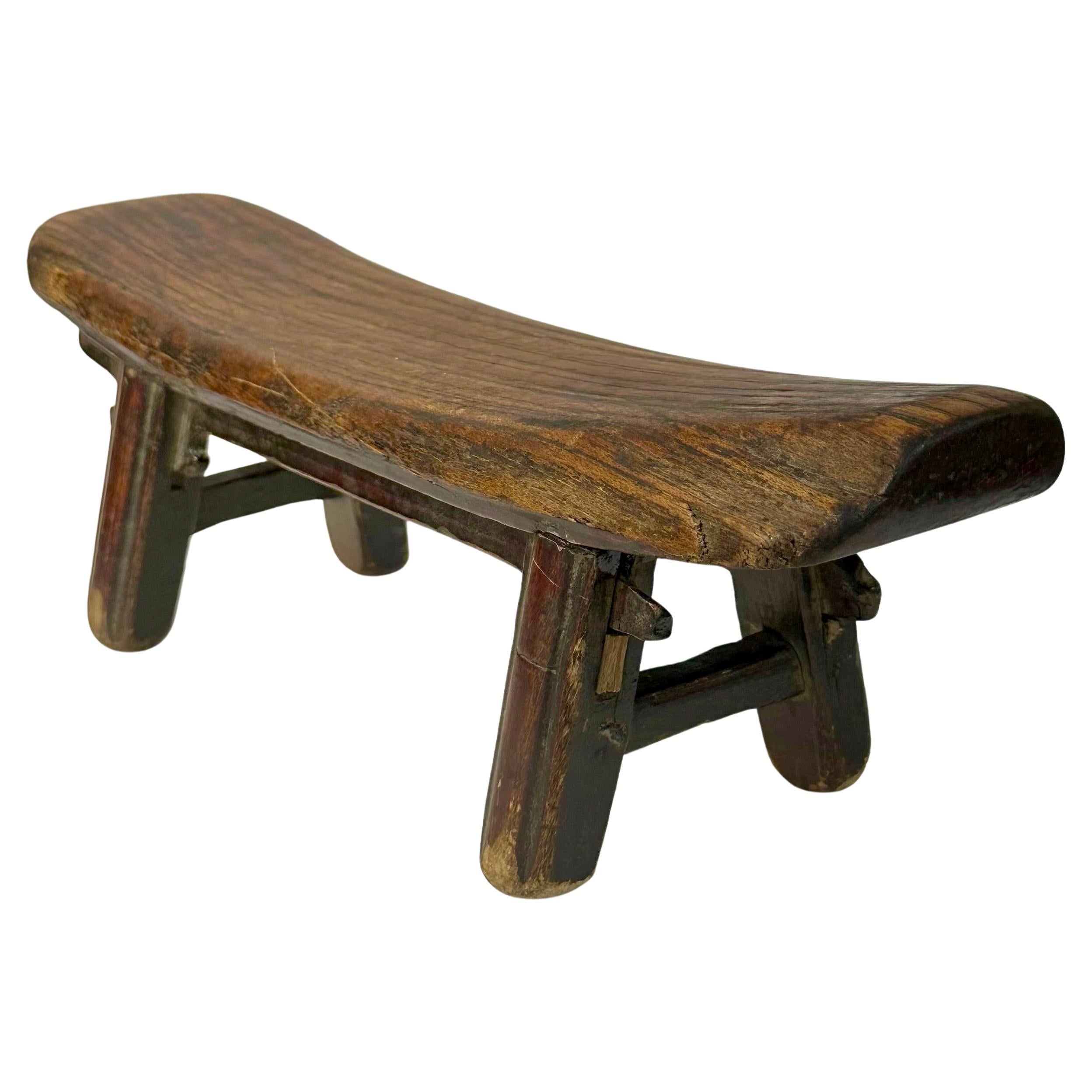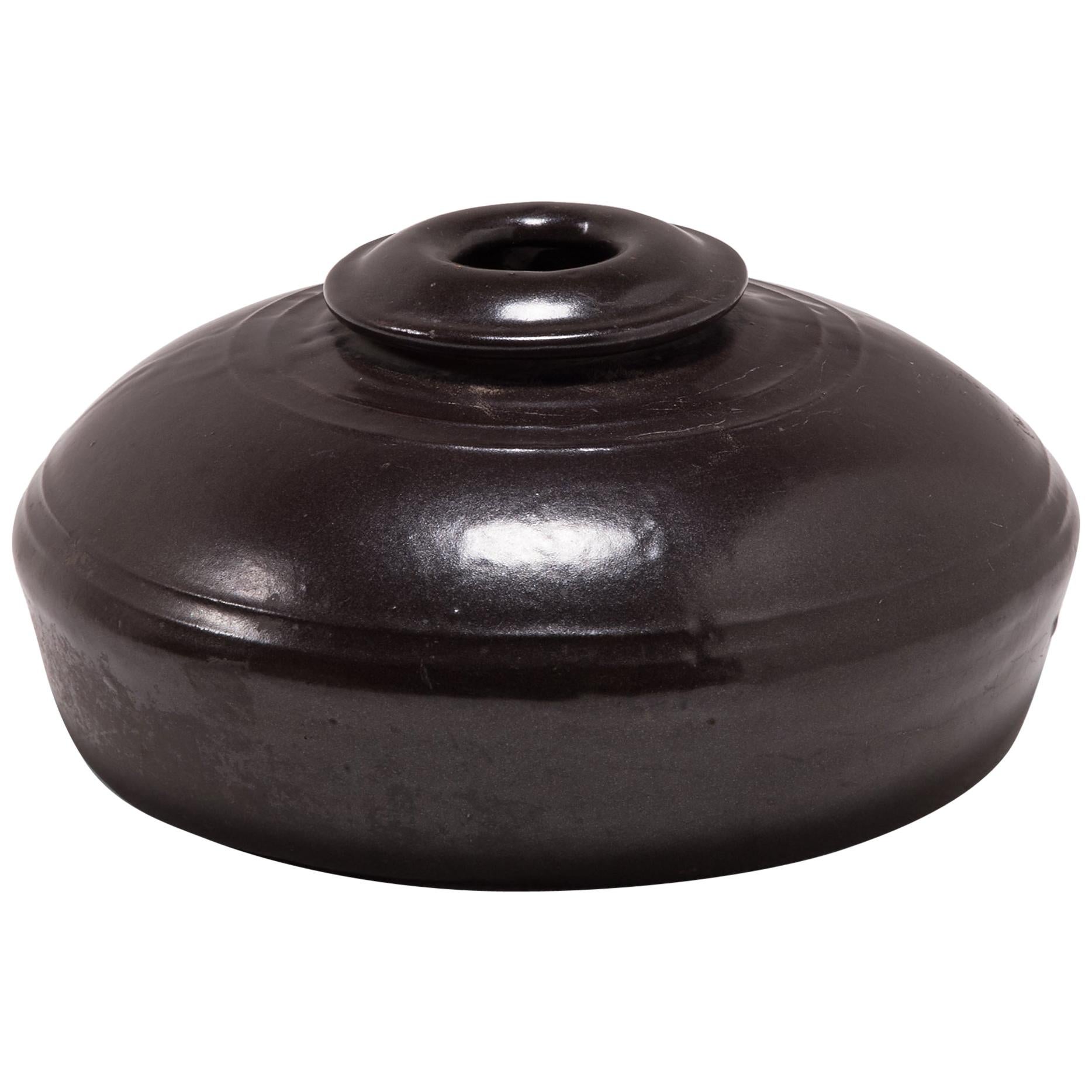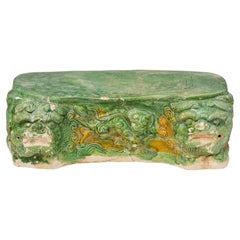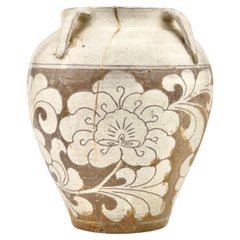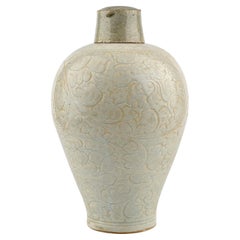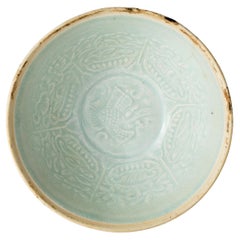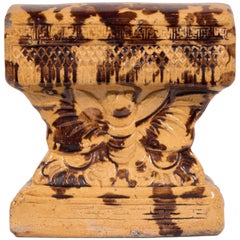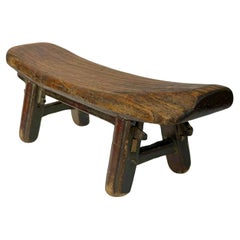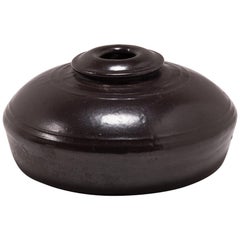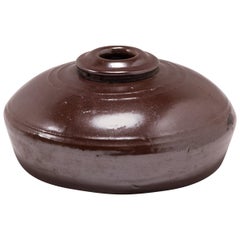Items Similar to Cizhou carved bean-shaped pillow, Song-Jin Dynasty, 11th-12th century
Want more images or videos?
Request additional images or videos from the seller
1 of 15
Cizhou carved bean-shaped pillow, Song-Jin Dynasty, 11th-12th century
$2,535
$3,90035% Off
£1,924.53
£2,960.8135% Off
€2,201.25
€3,386.5435% Off
CA$3,541.76
CA$5,448.8735% Off
A$3,939.21
A$6,060.3335% Off
CHF 2,056.93
CHF 3,164.5135% Off
MX$47,936.03
MX$73,747.7435% Off
NOK 26,270.19
NOK 40,415.6835% Off
SEK 24,636.81
SEK 37,902.7835% Off
DKK 16,428.78
DKK 25,275.0435% Off
Shipping
Retrieving quote...The 1stDibs Promise:
Authenticity Guarantee,
Money-Back Guarantee,
24-Hour Cancellation
About the Item
Crafted from fine clay, the pillow's surface boasts a sophisticated carved design featuring a floral motif that is both symmetrical and organic. The interplay of the earthy tones and the creamy white slip beneath reveals the intricate craftsmanship involved in its creation. This dual-tone effect was achieved through the sgraffito technique, where the top layer of slip is carved to expose the contrasting clay body underneath.
The form of the pillow, with its rounded edges and smooth contours, not only exemplifies the aesthetic values of the period but also illustrates the practical considerations of comfort and function in everyday objects of the time.
A piece like this would not only serve as a functional item in daily life but also as a decorative element, displaying the owner's sophisticated taste and the cultural importance of art in domestic life during the Song-Jin dynasty.
Period : Song-Jin Dynasty, 11th-12th Century
Type : Pillow
Medium : Cizhou Ware
Provenance : Acquired in 1999, Hongkong
Reference :
1) Bonhams London 2 NOVEMBER 2020 Asian Art - Lot 349
(Price : 3,000-4,000 GBP / Type : Closely related)
* Cizhou Ware
Cizhou is the name given to a number of stonewares, grey or buff, of varying degrees of hardness, with painted, incised or carved decoration on a clay slip. These stonewares were not only made in the region of Cizhou, Hebei Province, but in several provinces of China during the Song, Yuan and Ming periods. The great centres of production were in the north of China in the provinces of Hebei, Henan and Shanxi.
Cizhou wares seem to have been very popular, made for a clientèle of rich merchants, at a period when the paintings of famous artists adorned the walls of tea houses of the capital. While this type of pottery did not apparently attract Chinese collectors of the 18th and 19th centuries, it was much appreciated by the Japanese as a kind of folk art, for its rustic look. Nowadays Cizhou fetch very high prices at public auctions.
In the past fifty years, kilns producing Cizhou wares have been identified and excavated. This has made it possible to know the exact origin of certain types and to study the evolution of the ware.
Song potters used several methods of decorating Cizhou: vases, jars, pots, boxes and pillows. Champleve decoration appears at the beginning of the Song period in Henan at Dengfengxian and at Xiuwu. This method consisted of covering the vessel with a white slip, then carving and incising the design as to expose the brown of the body below. The whole surface was then glazed. After firing, the brown of the body formed a striking contrast with that of the glaze covering the white slip. Sometimes the design stands out against a ground of little circles stamped with a metal or bamboo tool. This decoration was often used on Tang metalwork. A variant of the technique used in the 11th century consisted of incising the little circles through the slip, then filling the lines with brick-red paint. The object, generally a pillow or cup, was then glazed. In another type of decoration called sgraffito, two layers of slip were placed one over the other, a brown slip, for example, over a white one, or vice versa over the parts destined for decoration; then the design was drawn by incising and scratching the upper layer, and the whole thing was covered with a transparent glaze.
Reference : Irv Graham
- Dimensions:Height: 5.52 in (14 cm)Diameter: 10.24 in (26 cm)
- Style:Chinoiserie (Of the Period)
- Materials and Techniques:Stoneware,Glazed
- Place of Origin:
- Period:
- Date of Manufacture:11th-12th century
- Condition:Minor fading.
- Seller Location:seoul, KR
- Reference Number:1stDibs: LU9577237780092
About the Seller
4.8
Gold Seller
Premium sellers maintaining a 4.3+ rating and 24-hour response times
Established in 1999
1stDibs seller since 2023
38 sales on 1stDibs
Typical response time: <1 hour
- ShippingRetrieving quote...Shipping from: seoul, Korea South
- Return Policy
Authenticity Guarantee
In the unlikely event there’s an issue with an item’s authenticity, contact us within 1 year for a full refund. DetailsMoney-Back Guarantee
If your item is not as described, is damaged in transit, or does not arrive, contact us within 7 days for a full refund. Details24-Hour Cancellation
You have a 24-hour grace period in which to reconsider your purchase, with no questions asked.Vetted Professional Sellers
Our world-class sellers must adhere to strict standards for service and quality, maintaining the integrity of our listings.Price-Match Guarantee
If you find that a seller listed the same item for a lower price elsewhere, we’ll match it.Trusted Global Delivery
Our best-in-class carrier network provides specialized shipping options worldwide, including custom delivery.More From This Seller
View AllA Sancai-glazed pottery 'Haitai' Pillow, Tang dynasty
Located in seoul, KR
The pillow is intricately decorated with a vibrant pattern, demonstrating the craftsmanship and artistic sensibilities of the period. The Haitai is a creature from Chinese mythology,...
Category
Antique 15th Century and Earlier Hong Kong Tang Antiquities
Materials
Earthenware, Pottery
$2,950 Sale Price
50% Off
Cizhou Lotus Carved Jar, Song-Yuan dynasty
Located in seoul, KR
This jar features a carved design, which is typical of Cizhou ware. It has a creamy white and brown color scheme, and the prominent decoration of lotus flower, which is a common motif in Chinese art and culture, symbolizing purity and enlightenment.
The carving technique involves coating the vessel with a layer of white slip (liquid clay), then carving away parts of it to create the design, revealing the darker clay body beneath. This technique allows for a strong contrast between the background and the carved motif.
Period : Song-Yuan Dynasty
Type : Jar
Medium : Cizhou Ware
Size : 21.5 cm(Height), 11cm(Mouth Diameter)
Provenance : Acquired in 1999, Hongkong
* Cizhou Ware
Cizhou is the name given to a number of stonewares, grey or buff, of varying degrees of hardness, with painted, incised or carved decoration on a clay slip. These stonewares were not only made in the region of Cizhou, Hebei Province, but in several provinces of China during the Song, Yuan and Ming periods. The great centres of production were in the north of China in the provinces of Hebei, Henan and Shanxi.
Cizhou wares seem to have been very popular, made for a clientèle of rich merchants, at a period when the paintings of famous...
Category
Antique 15th Century and Earlier Hong Kong Antiquities
Materials
Pottery
$3,835 Sale Price
35% Off
A Qingbai Carved Meiping Porcelain, Song Dynasty
Located in seoul, KR
The vase exhibits a finely crafted structure, characterized by its wide shoulders and elongated, tapering sides, topped with a compact, ribbed cylindrical neck. Its exterior is adorn...
Category
Antique 15th Century and Earlier Hong Kong Ceramics
Materials
Ceramic, Porcelain
$6,965 Sale Price
65% Off
Qingbai Bowl with carving of crane, Song Dynasty
Located in seoul, KR
The crane, a traditional symbol of longevity and auspiciousness, is prominently placed at the center, creating a harmonious and aesthetically balanced effect. The border of the dish ...
Category
Antique 15th Century and Earlier Hong Kong Chinese Export Antiquities
Materials
Porcelain
$1,192 Sale Price
20% Off
Large Cocoon-shaped jar with cloud-scroll design, Han Dynasty
Located in seoul, KR
This jar would have served as a mortuary object (mingqi), placed in a tomb as a substitute for the more valuable bronze and lacquer vessels used in daily life. Along with a variety o...
Category
Antique 15th Century and Earlier Hong Kong Han Antiquities
Materials
Pottery
$1,813 Sale Price
30% Off
Cizhou Rectangular Pillow with Carved Decoration, Yuan Dynasty
Located in seoul, KR
Cizhou ware is known for its robust forms and freely applied decoration, often featuring a white slip under clear glaze. The pillow is rectangular, with a slightly curved top surface to accommodate the head of the sleeper. The decoration on this pillow features an incised design, delineated with fine lines to create a clear and simplistic representation. The motif includes floral elements, likely peony or chrysanthemum, and foliage, which were popular during the Song and Yuan periods. The carving is subtle yet skillful, showing the artistry and aesthetic preferences of the era.
Period : Yuan Dynasty, 13th-14th Century
Type : Pillow
Medium : Cizhou Ware
Provenance : Acquired in late 1990s from Hongkong
Reference :
1) Datong Museum - Cizhou Pillow...
Category
Antique 15th Century and Earlier Hong Kong Antiquities
Materials
Pottery, Stoneware
$2,535 Sale Price
35% Off
You May Also Like
Antique Chinese Stoneware Pillow 19th Century
Located in Katonah, NY
Antique Chinese pillows were made from a wide range of materials, including bamboo, jade, porcelain, and wood. Traditionally solid, they were sometimes used with softer fabric over them. We are pleased to offer this pillow, which is decorated with brown glazes allowed to run over beige-colored stoneware. On both sides, the impressed design is a honeybee and honey combs symbolizing a wish for sweet dreams. Along the top and bottom of the pillow are traditional Chinese cloud collar...
Category
Antique 19th Century Chinese Qing Ceramics
Materials
Stoneware
19th Century Elmwood Pillow from Shanxi
Located in Singapore, SG
This wooden pillow from Shanxi takes the form of a traditional Chinese bench, beautifully miniaturized with a gently curved top surface for resting one's head. What is special about ...
Category
Antique 1870s Chinese Qing Antiquities
Materials
Elm
Chinese Quilt Warmer Vessel, c. 1900
Located in Chicago, IL
This unusual squat vessel would have been kept near a kang platform to warm one's blankets before bed. Much like a hot water bottle, the ceramic vessel was filled with hot water thro...
Category
Early 20th Century Chinese Qing Jars
Materials
Ceramic
Chinese Quilt Warmer Vessel, circa 1900
Located in Chicago, IL
This unusual squat vessel would have been kept near a Kang platform to warm one's blankets before bed. Much like a hot water bottle, the ceramic vessel was filled with hot water thro...
Category
Early 20th Century Chinese Qing Vases
Materials
Ceramic
Chinese Asian Antique Qing Water Bottle Vessel Bed Warmer With Floral Design
Located in Studio City, CA
A beautifully decorated Chinese late Qing-dynasty (1644–1911) hot water bottle, originally used to heat a bed or warm the body. This piece is made of brass (it could be bronze but w...
Category
Early 20th Century Chinese Qing Metalwork
Materials
Brass
Chinese Quilt Warmer Vessel, c. 1900
Located in Chicago, IL
This unusual squat vessel would have been kept near a kang platform to warm one's blankets before bed. Much like a hot water bottle, the ceramic vessel was filled with hot water thro...
Category
Early 20th Century Chinese Qing Vases
Materials
Ceramic
More Ways To Browse
12th Century
11th Century
12th Century Furniture
Chinese Song Dynasty
Song Dynasty Furniture
Asian Metal Wall Art
Antique White Stoneware
11th Century Furniture
Brown And White Chinoiserie
Song Dynasty Vase
Antique Chinoiserie Painting
Ming Dynasty Pottery
Ming Dynasty Vases
Asian Box On Stand
18th Century Stoneware
18th Century Art Tools
18th Century Japanned Box
Antique Stoneware Jars
